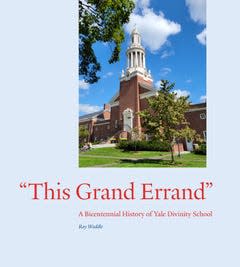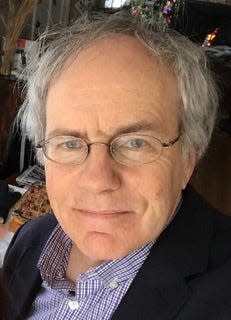Former Shreveporter chronicles divinity school history, reflects on religion
Author Ray Waddle’s interest in religious issues may have started when he was a kid growing up in the Broadmoor neighborhood in Shreveport.
“The neighborhood was surrounded by houses of worship. What made them different? Was God’s message the same in them all? Civil rights and Vietnam and pop music were surging—what did all these churches have to say?” Waddle said. “We attended church every week—a United Methodist congregation several miles away… We passed a lot of churches along the way. Why so many denominations? I think I became a writer to ask questions and find out.”
Writing about religion as a journalist and book author became “a way to write about America itself. It meant hearing personal stories of faith and struggle, how all kinds of people put together their own experiences of God or spiritual quests,” he said.

That journey led Waddle to write “This Grand Errand: A Bicentennial History Of Yale Divinity School,” a comprehensive look at the school and its impact on theology, religious life and culture across two centuries. The book is an outgrowth of Waddle’s work since 2007 as editor of the school’s “Reflections,” a journal that explores theological dimensions in national issues.
“It was a great project to undertake—the story of a historic divinity school, the way it has always approached Christian belief as a matter of both mind and heart,” he said. “The school continues to be a leading educator of ministers, scholars, chaplains, nonprofit innovators, denominational executives and deans of theological schools.”
Why religion matters in today’s world
“The world is a battered place these days, anxious and grieving. Organized religion is suffering declines in many places. Can it recover? It’s a worrisome question. But history is a fluid dynamo, unpredictable and so are the winds of the Spirit. Faith traditions have the capacity to teach their doctrines in new ways, revisit the strange power of scripture, rediscover the poetry of belief, respond to human pain, pay attention to the questions of new generations. Sociologists used to predict the disappearance of religion in the face of secularism. I don’t hear those predictions anymore.”
Waddle thinks of congregations “as firewalls of hope. They give people room to pray, connect, exchange the peace, sing, repair, heal, attend to the soul, retain trust in the universe or find it again. People will always seek these things.”
Hope in faith traditions
“People are understandably alarmed or exhausted by the era’s bad news and runaway technology, but a basic human condition carries on. It is still attuned to spiritual answers, it feels awe, it imagines reconciliation. Faith traditions remind the world there’s a bigger narrative going on, a cosmic story we’re invited to join: God’s dream for human dignity, community and creation. It’s a counterweight to despair and egotism.
“To me this is what hope is: The mysterious divine presence will get the last word. It’s not always easy, but I think of hope as something practical and realistic, not a form of wishful thinking against all odds. Hope makes room for a skeptical view of human conduct while trusting a Creator that still abides. Hope admits life’s terrible brokenness, but it can give people a sense of purpose in the sacred adventure.”

More about the author
Waddle has also written three other thoughtful books, which I recommend—“Undistorted God” (Abingdon Press, 2014), drawing on his journalistic encounters over the years to flesh out new angles on Christian experience; “Against The Grain: Unconventional Wisdom from Ecclesiastes”(Upper Room, 2005), “commentary on the strangest book in the Bible;” and “A Turbulent Peace: The Psalms for Our Time” (Upper Room, 2003), which meditates on each of the 150 Psalms. He worked as a reporter at The Shreveport Times from 1981-84, then as religion editor at The Tennessean in Nashville from 1984-2001. (Fun fact: Waddle and I interned at The Times together when we were college students.)
And his thank you to Caddo teachers
“My Caddo Parish teachers provided vocational discovery: Elizabeth Lawson (journalism class, senior year, Captain Shreve); Marie Rinaudo (English, senior year); Beverly Sibley (typing class, ninth grade, Youree Drive). I’m grateful to all of them.”
Columnist Judy Christie is the author of 18 books, including the fictional “Gone to Green” series and the nonfiction “Before and After: The Incredible Real-Life Stories of Orphans Who Survived the Tennessee Children’s Home Society.” Co-authored with Lisa Wingate, it is the true sequel to Wingate’s bestselling novel “Before We Were Yours.” For more about Christie, see www.judychristie.com or follow her on Facebook at https://www.facebook.com/JudyChristieAuthor.
This article originally appeared on Shreveport Times: Former Shreveporter chronicles divinity school history, reflects on religion
